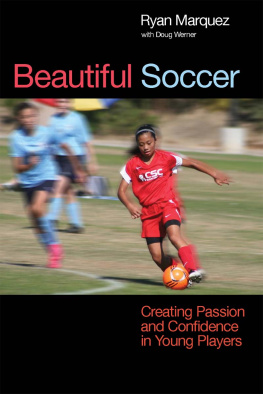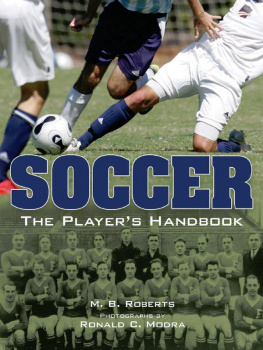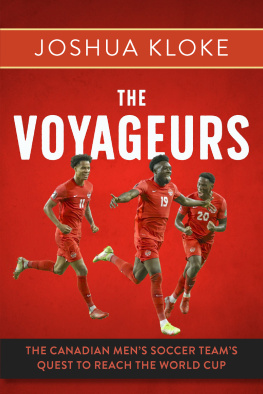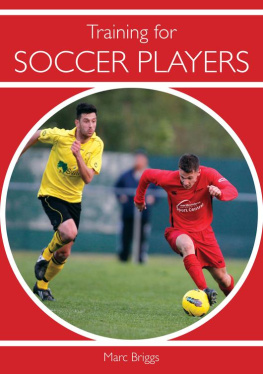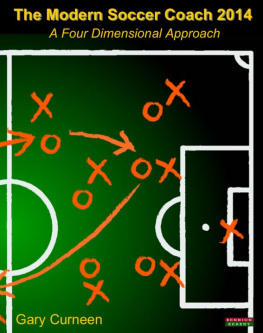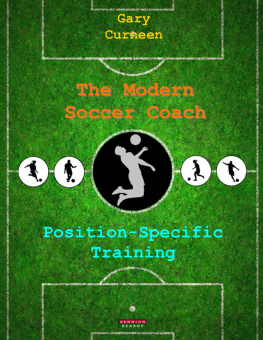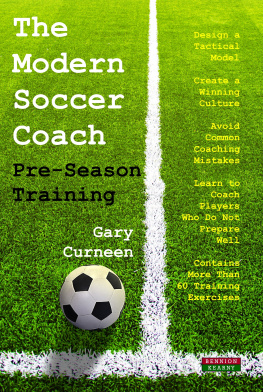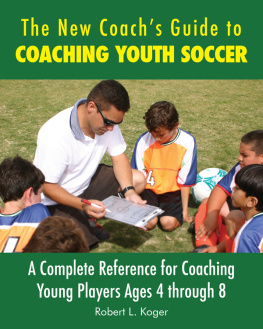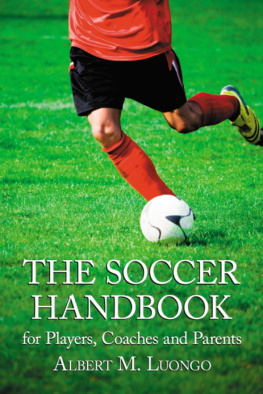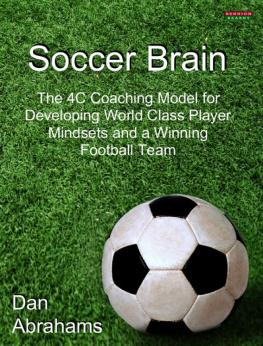
Beautiful Soccer
Ryan Marquez / Doug Werner
 | Tracks Publishing |
| 140 Brightwood Avenue |
| Chula Vista, CA 91910 |
| 619-476-7125 |
| www.startupsports.com |
| trackspublishing.com |
All rights reserved. No part of this book may be reproduced or transmitted in any form or by any means, electronic or mechanical, including photocopying, recording or by any information storage and retrieval system without permission from the author, except for the inclusion of brief quotations in a review.
Copyright 2012 by Ryan Marquez and Doug Werner
10 9 8 7 6 5 4 3 2 1
Marquez, Ryan.
Beautiful soccer : creating passion and confidence in young players / Ryan Marquez, Doug Werner. San Diego, Calif. : Tracks Pub., c2012.
p. ; cm.
ISBN: 978-1-935937-43-2
Includes index.
Summary: This book explores the role of coaches and parents, emphasizes the importance of team identity and a team mindset, and presents the necessary foot skills to help young soccer players both perform better and have more fun. Moreover, this book advocates a soccer culture free from the fear of failure; instead players, coaches and parents are encouraged to foster confidence, passion, creativity and the desire to try and keep trying.Publisher.
1. Soccer for childrenCoaching. 2. Soccer for children Training. 3. Soccer for childrenPsychological aspects. 4. Soccer Coaching. I. Title.
| GV944.2 .M37 2012 | 2012939527 |
| 796.33/4077--dc23 | 201206 |
Acknowledgements
This book would not have happened without the help and expertise of these fine people. Thank you, friends. Thank you, beautiful daughter.
Allie Barbara demonstrated collecting and offensive technique.
Jeff Healy had the idea.
Karl Leckner took the cover shot.
Cristina Martinez Byviks illustrations highlighted our ramblings.
Phyllis Carter, our editor, made sure we sounded reasonably intelligent.
Chris Muranyi demonstrated just about everything.
Fred Muranyi reviewed just about everything.
Emily Tran graces our front cover.
Joy Werner demonstrated the moves and drills.
Contents
Skill,
Courage,
Artistry
Its so important to teach the kids HOW TO PLAY.
When little Billy or Suzi is 7 or 8 its more important they learn how to dribble and kick and collect than it is for their tiny tots team to win this Saturday. In fact, its more important that they continue to hone their skills for the next several years than it is to score more goals than the other guys.
Thats a very hard thing to get across because we all want to win all the time at any age. Just learning stuff sounds like a cop out. OK we lost, but boy we sure moved the ball well! I mean, who cares about that! We all should. Thats who. If the kids are not learning skills, if they cannot confidently manipulate the ball, they will play with fear. Teams will rely on a few athletic players to make plays and score goals while everyone else plays some sort of supporting role. That usually means kickball. No skill means fear means kickball.
You hear it all the time from the sidelines. Get the ball outta there! Kick it out! Kick it down-field! Coaches and parents scared out of their minds when players make mistakes and lose the ball. So what happens? Kids dont feel encouraged to expand their talents. They become afraid to try. If the ball comes to them, they just want to kick it away. Thats no fun for anybody.
Let the kids learn how to play. Encourage them ALL to work hard and get better so they can derive real satisfaction from the game. From skill comes courage. We want to develop fearless artists on the ball who can play anywhere when they grow to be high school and college players.
Thats worth shooting for.
Ryan Marquez
Talking to Coach Ryan
Over the course of about six months Ryan Marquez and I conducted six interviews regarding the state of competitive youth soccer. They are somewhat rambling, but there were some very good points made and even a couple controversial ones.

Ryan is a good source for comment because he is a head high school coach and a director for a soccer club with a number of years playing and coaching behind him. He is young, enthusiastic, knowledgeable and does not yell at his players the latter a singular coaching trait. He commands respect through his pure love of the game and by teaching it so very well to young people.
I think what Ryan has to say is very important, and I should know because I have been a Soccer Dad for a number of years and have seen my share of teams and coaches. Most programs have been flawed for reasons we get into later. I am sure my experiences are not unique. But I didnt want to publish a bash piece so I left out (most of) the rants. We present a way of thinking that should make soccer better for our kids, for parents and for coaches.
Doug Werner
The
Problem
We dont realize that the more our kids are skilled, the more they can benefit from systems and the more we can bring out of a system. We need to fully commit to skill sets even though there may be a price to pay.


We develop kids that show immediate talent and everyone else is sort of filling space.
We are not preparing kids for the long term five to ten years. We are preparing kids for this Saturday.
Is there a problem with competitive youth soccer in the United States? The main thing is the structure. In the U.S., coaches are judged by how many wins they get this season.
Success is based on immediate results? Yes, immediate results. By contrast, European coaches are judged by how many players they groom for the professional levels. For us, its winning right away. We are not preparing kids for the long term five to ten years. We are preparing kids for this Saturday.
When you say kids, what ages? In Europe and South America, development can start very young. Like 7, 8. The very serious stuff is probably 14 and up, but the younger kids are already getting base skills.
You have one or two kids learning a lot and all the other kids learning how to play it safe.
Development lags here in America because our professional league is not yet established. Our leagues are starting to grow, but its going to take time. Our professional league has been around 18 years or so, but its taken time for them to grow youth leagues, to create academy teams.
Why arent most clubs developing to the next level? The biggest problem is that coaches and the club are judged by the next game.
Are coaches looking for kids with the natural talent and then just getting them the ball?

